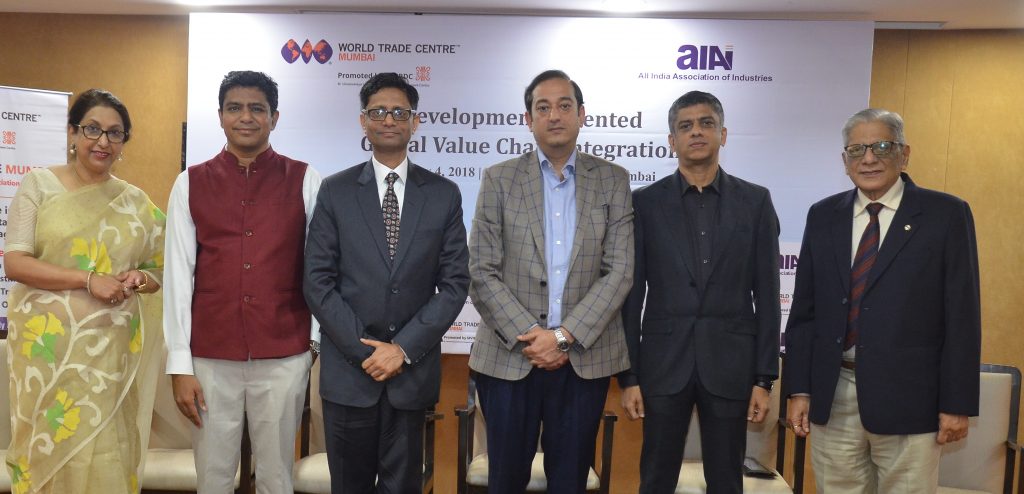“India’s MSMEs must become cost-competitive in product design and development so that they become attractive partners to lead firms in the global value chains. Indian companies must move up the value chain by establishing globally competitive design hubs, especially in sectors such as textile and leather, jewellery and automobile,” said Mr. Abhijit Das, Professor & Head, Centre for WTO Studies, Indian Institute of Foreign Trade (IIFT) at the Programme on ‘Development-oriented Global Value Chain Integration’ at World Trade Center Mumbai. The programme was jointly organized by World Trade Center Mumbai and All India Association of Industries (AIAI). This programme is a curtain-raiser to the 7th Global Economic Summit on the theme ‘GLOBAL VALUE CHAINS: Accelerating MSME Growth, Development and Sustainability’, which is scheduled from February 22-24, 2018 at World Trade Center Mumbai.The programme generated intellectually stimulating discussions among industry leaders, academicians, and start-up companies on how Indian companies can integrate in global value chains.
Mr. Gagan Sabharwal, Senior Director, Global Trade Development, NASSCOM said, “India’s information technology (IT) sector has been part of Global Value Chain (GVC) for many years and has created millions of jobs for India. Global companies have been leveraging India’s capability to deliver on the product Engineering, IT management, research and development (R&D) and BPM services from India for the past two decades. As India projects itself as preferred manufacturing hub through various government initiatives, it is important that we tweak the narrative and introduce servification of the manufacturing to make it more appealing for the Global corporations. World today demands Smart Solutions and not dumb products and if India can create this ecosystem by leveraging its software capabilities then it will have a great story to sell.”
In his speech, Mr. TS Venketram, Senior Director, Supply Chain, Kellogg India pointed out that India has great potential to develop a viable value chain in the food processing sector. Highlighting the strengths of India’s agro-based sector, Mr. Venketram said “India is a producer of a variety of farm commodities; also most of the crops grown in this country are not genetically modified.” However, Mr. Venketram emphasized the need to develop robust infrastructure to support value chain in this sector.
The programme featured a case study on how India’s FMCG major Godrej Consumer Products (GCPL) manages its vendors across Asia, Latin America and Africa. Mr. Manoj Kothari, Head – International Sourcing, GCPL delivered the case study.
Earlier in her welcome remarks, Ms. Rupa Naik, Senior Director, World Trade Center Mumbai said, “Global Value Chain is an effective tool for enhancing the footprint of MSMEs, women entrepreneurs and industry clusters in the global market. In order to promote India’s integration into GVCs, we must upgrade our logistics and supply chain infrastructure, focus on skill development, improve access to finance and cutting edge technologies for local MSMEs.”
The programme ended with vote of thanks by Mr. Y.R. Warerkar, Executive Director, World Trade Center Mumbai.

From (L-R): Ms. Rupa Naik, Senior Director, MVIRDC World Trade Center Mumbai, Mr. Manoj Kothari, Head – International Sourcing, Godrej Consumer Products (GCPL), Mr. Abhijit Das, Professor & Head, Centre for WTO Studies, Indian Institute of Foreign Trade (IIFT), Mr. Gagan Sabharwal, Senior Director, Global Trade Development, NASSCOM, Mr. TS Venketram, Senior Director, Supply Chain, Kellogg India, Mr. Y. R. Warerkar, Executive Director, MVIRDC World Trade Center Mumbai at the precursor Panel Discussion on ‘Development-oriented Global Value Chain Integration’ jointly organised by World Trade Center Mumbai and All India Association of Industries at the World Trade Center Mumbai on January 4, 2018.

 : +91 7718886506
: +91 7718886506